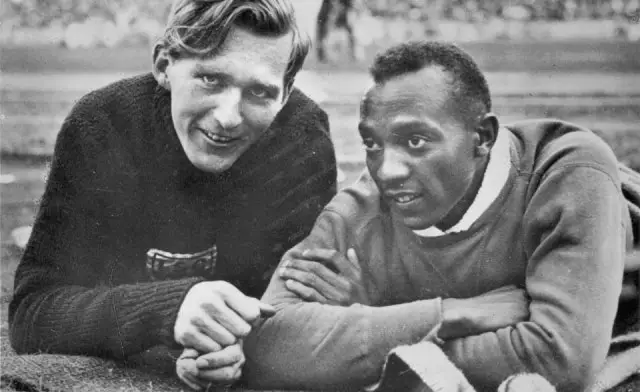My Greatest Olympic Prize
Introduction to Author:
Jesse Owens, the author of “My Greatest Olympic Prize,” was a legendary African American track and field athlete who became an international symbol of excellence, sportsmanship, and racial equality. Born on September 12, 1913, in Oakville, Alabama, Owens overcame racial discrimination and poverty to become one of the greatest athletes in history. He achieved global fame by winning four gold medals in track and field events at the 1936 Summer Olympics in Berlin, Germany, defying Adolf Hitler’s Aryan superiority theory. Jesse Owens’ remarkable achievements on and off the track continue to inspire generations.
Summary of “My Greatest Olympic Prize”:
Jesse Owens’ essay, “My Greatest Olympic Prize,” reflects on his personal experiences during the 1936 Summer Olympics in Berlin. While Owens is celebrated for his historic victories and remarkable athletic feats during the Games, this essay offers insight into a lesser-known aspect of his Olympic journey.
In Berlin, Owens faced the daunting challenge of competing in a racially charged atmosphere under Adolf Hitler’s regime, which promoted the false ideology of Aryan racial superiority. The international sporting event was intended to showcase German prowess and validate Hitler’s claims of Aryan supremacy.
Owens recalls the pressure and scrutiny he endured as he represented not only himself and his country but also his race. The stakes were incredibly high, as he was aware that his performances would have broader implications for the African American community and challenge the prevailing racial prejudices.
The essay also sheds light on an unexpected friendship that developed between Owens and a German competitor, Luz Long, during the long jump competition. Despite the racial tensions of the time, Long displayed sportsmanship and camaraderie, offering crucial advice to Owens during the trials. Their bond transcended borders and prejudices, serving as a testament to the unifying power of sports and friendship.
Ultimately, Owens went on to achieve greatness at the Olympics, winning four gold medals and disproving Hitler’s notions of racial superiority. However, he believes that his greatest Olympic prize was not the gold medals themselves but the enduring friendship he formed with Luz Long.
Jesse Owens’ narrative underscores the significance of human connections, the triumph of the human spirit, and the ability of sports to bridge divides and inspire positive change, even in the face of adversity and prejudice. His story serves as a timeless reminder of the power of unity and friendship in the pursuit of a more equitable world.
Question And Answer
Unit-1
Why were nationalistic sentiments running high during the 1936 Summer Olympics in Berlin?
Ans: Nationalistic sentiments were running high during the 1936 Olympics in Berlin because Adolf Hitler, who promoted Aryan superiority, confidently claimed that his athletes would win all the gold medals, defeating those from other races.
In the statement, “I wasn’t too worried about all this,” what does ‘this’ refer to – Hitler’s beliefs or winning a gold medal?
Ans: In the statement, “I wasn’t too worried about all this,” ‘this’ refers to ‘Hitler’s beliefs.’
Why wasn’t Owens concerned about Hitler’s beliefs?
Ans: Owens wasn’t concerned about Hitler’s beliefs because he had dedicated six years of hard work, training, and discipline with the Olympic Games in mind. He had already set a world record of 26 feet 8 inches in the long jump.
Why did everyone anticipate that Owens would easily win the long jump?
Ans: Everyone expected Owens to easily win the long jump because he had already set a world record with a jump of 26 feet 8 inches.
What surprise awaited Jesse Owens in Berlin?
Ans: In Berlin, Jesse Owens was surprised to see a German athlete named Luz Long, who was also competing in the long jump event. Long had demonstrated impressive skills during practice jumps.
What did Jesse Owens learn from people about Luz Long?
Ans: Jesse Owens learned from people that Adolf Hitler had kept Luz Long hidden from the public eye, presumably hoping that Long would secure victory in the long jump.
Did the Nazi Aryan superiority theory imply that Germans were superior to Negroes? How did Owens feel about this, angry or concerned?
Ans: Yes, the Nazi Aryan superiority theory suggested that Germans were superior to Negroes. Jesse Owens felt angry about this ideology.
What motivated Jesse Owens to aim for victory against Luz Long?
Ans: Jesse Owens was determined to defeat Luz Long because he wanted to challenge and disprove Hitler’s theory of Aryan superiority. He believed that talent should be recognized and honored, regardless of one’s race.
Unit-2
What is a coach’s perspective on an athlete’s anger?
Ans: According to a coach, an angry athlete tends to make mistakes and struggles to achieve success due to a lack of focus and concentration.
What were the outcomes of Jesse Owens’ first two qualifying jumps?
Ans: Jesse Owens was disqualified in his first two qualifying jumps as he failed to meet the required standards.
Why did Jesse Owens kick the pit during the trials?
Ans: Jesse Owens kicked the pit out of frustration and disappointment after failing to qualify in his first two attempts, which left him feeling depressed.
Who extended a firm handshake to Owens, and what was the nature of their interaction?
Ans: Luz Long offered Jesse Owens a firm handshake, and it was a friendly gesture of sportsmanship and camaraderie.
Why did Luz Long engage in conversation with Jesse Owens during the trials? Was his intention to establish friendship with Owens or to discover the cause of Owens’ distress?
Ans: Luz Long initiated a conversation with Jesse Owens during the trials with the intention of befriending him. He wanted to offer support and friendship to Owens.
What does the phrase “He really looked the part” imply? Does it suggest that Luz Long was trying to portray himself as an Aryan or that he had the appearance of belonging to a superior race?
Ans: The phrase “He really looked the part” suggests that Luz Long had the appearance of belonging to a superior race due to his strikingly handsome and impressive physical presence.
How did Luz Long assist Jesse Owens in qualifying for the final jumps?
Ans: Luz Long advised Jesse Owens to draw a line behind the takeoff board and jump from that point to avoid committing a foul. Jesse followed Long’s advice, which enabled him to qualify successfully.
What did Luz Long mean when he said, “Tomorrow is what counts”? Did he imply that Owens would win the next day or that their performance on the following day would hold more significance?
Ans: When Luz Long said, “Tomorrow is what counts,” he meant that their performance on the next day would be the decisive factor. He did not imply that Owens would win automatically but emphasized the importance of the final day’s performance.
Did Jesse Owens qualify for the final jump, and how did he manage to do so?
Ans: Yes, Jesse Owens qualified for the final jump. He achieved this by drawing a line a full foot behind the takeoff board and executing his jump from that point, ensuring that he qualified with nearly a foot to spare.
We sincerely appreciate your time and interest in our content My Greatest Olympic Prize . Your support means the world to us, and we’re thrilled that you chose to visit our page.
At AskXYZ, we’re committed to delivering valuable and engaging content. We want to ensure that your experience with us is exceptional. That’s why we invite you to explore more of our posts/articles. We’re confident you’ll find something that piques your interest.
Your feedback is incredibly important to us. It helps us understand what you love and how we can improve. Please take a moment to share your thoughts or suggestions. We’re all ears!
Explore our other posts/articles and share your feedback with us .






